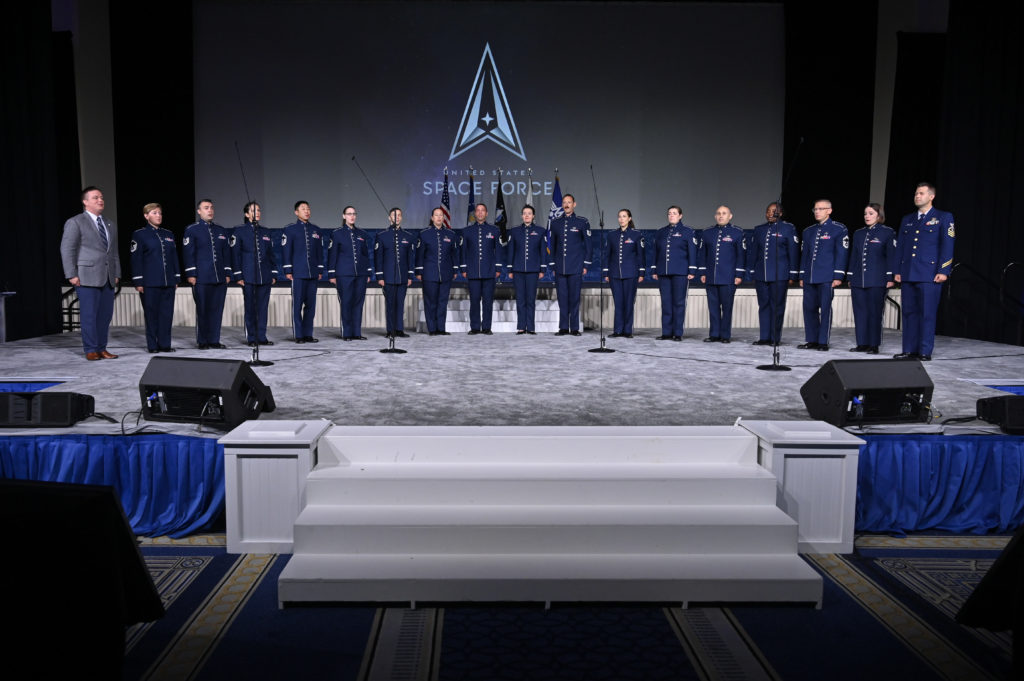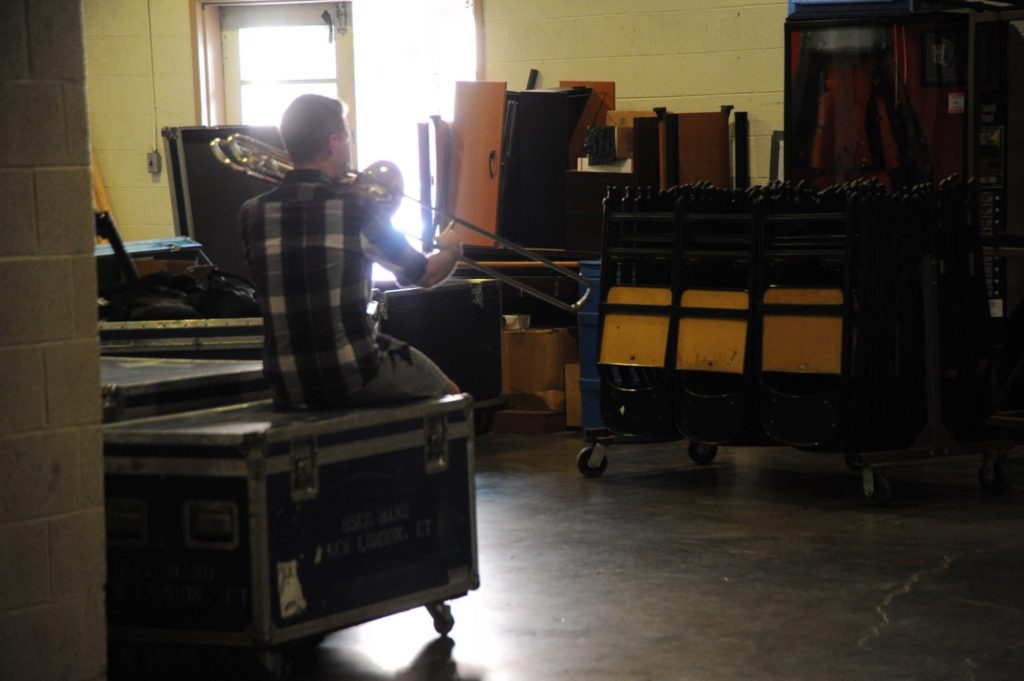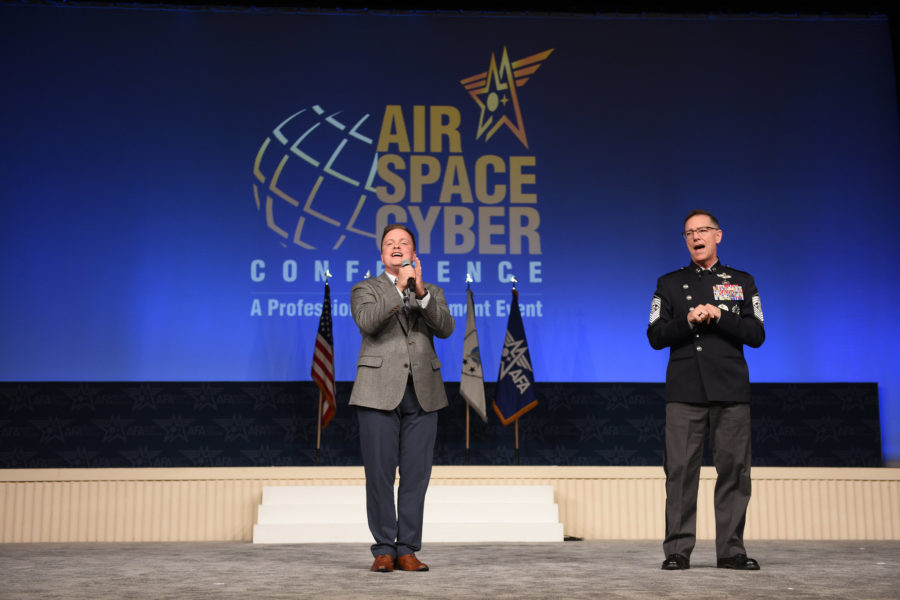Jamie Teachenor was living in Nashville in 2015 and browsing Craigslist for vintage guitars when he spotted the unlikely ad that ultimately led to his occupying a unique place in military history.
The Air Force Academy’s country band Wild Blue Country needed a lead vocalist. Teachenor later found out the ad was up for only a matter of hours.
“It wasn’t supposed to be advertised that way,” he recalled while headed back home to Nashville from AFA’s Air, Space & Cyber Conference with his wife and two kids. “For whatever reason, I saw it in that small amount of time, and I called Colorado Springs and asked if it was legitimate.”
After a few more questions, “I put Colorado Springs’ weather on my phone, because I knew we were going to Colorado Springs,” he recalled. Without having yet auditioned, “I knew that was part of my path.”
He became a senior airman with the band, which performed at events for both the Air Force Academy and what was then Peterson Air Force Base, home to the Space Force’s predecessor, Air Force Space Command.
Given that this frequently put him in contact with military space personnel, it’s hard to imagine anyone better positioned to supply the words and melody to the Space Force’s new official song, “Semper Supra,” which debuted at the conference.
Together with a Coast Guard trombonist who doubles as musical arranger, Teachenor composed “Semper Supra”—named for the service’s popular motto—to join the likes of the Air Force’s official song “The U.S. Air Force,” a.k.a. “Wild Blue Yonder.”
“What was very interesting about my time of service was I knew what the space capabilities were for space operators before they were Guardians,” Teachenor said. He also met today’s Chief of Space Operations Gen. John W. “Jay” Raymond and Chief Master Sergeant of the Space Force Roger A. Towberman at that time. As Teachenor’s enlistment wound down in 2019, he even went along on a trip with the two leaders to Thule Air Base in Greenland, which performs missions in space surveillance and missile defense.
“I got to see so much of what our now-Guardians—but at the time they were Airmen—do and just was blown away by their mission,” Teachenor said. He felt like the trip “had a lot to do with how the song was written because I saw firsthand just the precision and the … amazing assets that we have in our folks who wear the uniform. And our civilians, too.”
Teachenor and his family went back to Nashville following the conclusion of his enlistment, and in December 2019, the Space Force came to be.
“Several folks reached out and said, ‘Hey, you know, the Space Force is actually going to be a branch—are you thinking about writing a song?’”
He didn’t quite laugh off the idea, and “eventually Gen. Raymond and Chief Towberman reached out to me and said, ‘Hey, would you consider writing something and just, you know, give us an option?’”

Feeling simply “honored and thankful just to even throw something in there,” Teachenor estimated that by February 2020, the song was largely complete:
“Semper Supra”
We’re the mighty watchful eye
Guardians beyond the blue
The invisible front line
Warfighters brave and true
Boldly reaching into space
There’s no limit to our sky
Standing guard both night day
We’re the Space Force from on high
Beyond the blue
The U.S. Space Force
“I knew they wanted something that was singable and that fit with the other anthems—the other service songs—and that would be something that could last. … They made it very clear they wanted it to be timeless.”
Months passed as the service narrowed down the submissions until choosing Teachenor’s.
Throughout the process, Space Force leaders made only one request, he said—to include the words “Standing guard both night and day” in order to emphasize the service’s continuous mission of “making sure that we’re safe and protected all the time.”
“And so I looked at that line and changed it. I believe it’s a better line for that,” said the recently elected county commissioner for Sumner County, Tenn.
The Score
Trombonist and arranger Coast Guard Chief Musician Sean Nelson responded to a callout to military band arrangers early in the Space Force’s search for a song. Now an 11-year member of the U.S. Coast Guard Band based at the Coast Guard Academy in New London, Conn., he’d been “a little green,” he said, when he originally auditioned for the Air Force Band in the competitive national auditions that draw high-caliber musicians who ultimately “come in fully trained for the job.”
He’d composed the score to an organization’s military-style service song once before, updating the march of the Commissioned Officer Corps of the National Oceanic and Atmospheric Administration.
By 2020, he’d made a submission to the Space Force based on a preliminary set of lyrics, and “the group listening really liked my version.” In the spring of 2022, “they contacted me again and said, ‘We’ve come up with this melody and lyrics’—and it was Jamie’s lyrics and Jamie’s melody—‘and we’re looking for somebody to complete the song, to harmonize it, to orchestrate it.’”
Nelson liked the lack of any other musical contribution such as a chord structure “because it allowed me to be creative with it.”

“What I would do is I would play the melody on the piano, and I would sing it, and I would keep trying different harmonies underneath it. And sometimes there’s harmony that is obvious, and sometimes there’s harmony that makes sense but is unexpected.”
He would ultimately compose 30 parts for a full military band, including the four-part vocal harmony performed at the Sept. 20 premiere by the Air Force’s Singing Sergeants as well as counter-melodies—“there’s the main melody that you sing, and there are multiple melodies going on at the same time above and below that melody that makes it sound full and thick and [gives it] a traditional march sound.”
Having performed the “Armed Forces Medley” of service songs at many military events, he well knew the need for the Space Force’s to fit in with the other traditional military marches. At the same time, he wanted to write something “that was maybe a little unexpected and maybe not as obvious and that had its own sounds as opposed to copying other military songs.”
To strike the balance, “you have to know the tradition”—specifically that of American march composer, the Marine Corps’ John Philip Sousa—“while knowing where you can break from it.”
Without such a well trained ear, “not everyone might notice it,” Nelson said, “but I think if you listen to it a few times, you start to notice, ‘Hey, that sounds a little fresh.’”
He sang the first two lines to demonstrate:
“We’re the mighty watchful eye; Guardians beyond the blue. …
“When you get to the word ‘blue,’ that chord is outside of the key—so it’s just a little bit surprising, I think. … Maybe you get a little extra sparkle out of it.”
Nelson suspects—based on his experience performing in the Coast Guard Band, usually without singers—that “the form that you’re going to hear the song in the most is actually going to be without singing.”
Next he expects bands and choruses across the U.S. to start adding “Semper Supra” to their medleys.
